 |
 |
 |
 |
 |
 |
 |
 |
 |
 |
| Out of Character |
The
writers and stars of Showtime's QUEER AS FOLK talk to "Put your legs up, over your shoulders. That's it," Brian breathlessly instructs Justin, as they lay naked in bed. Justin stops him. "Wait. In school we had this lecture about safe sex." Brian replies confidently, "And now we're going to have a demonstration." Brian reaches for a condom, tears it open with his mouth, and gives it to Justin. "Put it on me. Go on. Slip it on..." This titillating scene aired in the premiere episode of Showtime's controversial series, Queer As Folk, which debuted in December 2000. Though early indications—like the fleeting moment described above—had critics worried that QAF's story about a group of gay and lesbian friends and their families in Pittsburgh would only give lip service to HIV/AIDS, the show has consistently developed HIV storylines. This is no Sex and the City where HIV is talked about once by the sexually active adults and then never heard about again. Cable Positive—a national nonprofit organization dedicated to promoting AIDS awareness through the communications industry–recently handed Queer As Folk one of its Positively Outstanding Programming (POP) Awards for 2001, and name QAF's home, Showtime, POP Network of the Year. "Showtime's Queer As Folk was honored at Cable Positive's First Annual POP Awards for its storylines concerning AIDS and the gay community," said Steve Villano, Cable Positive's Executive Director. "With the increasing number of HIV infections amoung young gay men, it is imperative that quality cable television programming such as Showtime's Queer As Folk is recognized." But Queer As Folk's first season was not a fluke. This season—which began this past January—saw Michael and Ted going to a "BB" party, thinking they will find bodybuilders. Instead they find barebackers and promptly leave. In another episode, Emmett packs up this friend Godiva's hospice room after she dies from an AIDS-related illness. Later, during a pride celebration, Emmett notes, "Look at them. Partying. Don't they know Godiva's dead?" Vic asks, "Why should these pups give a shit about some old queen who died of AIDS?" Countering Emmett's shock, Vic adds, "I'm allowed to say that. I'm an old queen. Who has AIDS." In the early episodes of the second seson, after Ben Bruckner's introduction, Michael learns just how difficult it can be to deal with a partner's HIV status. "Michael can't do it," explains Sparks, a comic and former host of E!'s Talk Soup. "He's scared, and not because it's his natural reaction but because everyone around him keeps reinforcing his fears. Michael tends to be a follower. This is one of the moments in his life when he grows up and realizes that he loves this person–How safe can you truly be when you're alive on this planet? Are you going to deny that from yourself for your whole life? As George Carlin might say: 'What do you wanna do? Play with your dick and eat at Wendy's for the rest of your life?'–that's kind of Michael's motto." Jack Wetherall has experienced healing in a different manner. "I've been on the frontlines as a caregiver. Living in New York and being part of the theater commuity, so many of my friends were stricken with HIV very early on. I really went to the wire with a close friend of mine and, remarkably, he has come back by taking the cocktail. I gained a lot of experience through that relationship. He is there for me now in terms of research and advice." Gless may sound a bit aggressive, but her passion comes from a place of caring. "I've lost several freinds to AIDS. It's hard to go on but you just do. What makes me feel better is knowing that I was there when they needed me. It makes the hurt less. Maybe I made the crossing easier?" she solemnly asks. During our conversation, Sharon expresses a burning desire to find time in her hectic schedule to work with an ASO. "It's something that I want to do. This is not just lip service. I want to get involved on a volunteer hasis with people who don't know me. And this is not me just jerking off. I can't tell you how strong the pull is. I feel ashamed saying this to you because I haven't done it." Recently, she was approached by an AIDS organization in Miami, where she resides with her husband, producer Barry Rosenzweig, and is seriously considering accepting its offer. "I want to do this like a regular person," she says modestly, quickly adding. "I sound like a jerk, don't I?" To bring life to her character on QAF, Gless says she plays Debbie from the fifth chakra—the heart chakra. She visited traditional coffee shops and diners to watch the old-time waitresses in action. ¯"I didn't write Debbie so I can't take the bow. Sometimes I think she is just too wonderful and maybe not real, but I can't tell you how many men come up to me and thank me, or ask for hugs. One man came up to me after an awards ceremony and asked if I would hug him. I said, Sure. I gave him a hug and he fell apart. He started sobbing and I just held on till he stopped. And as I was holding him, I just kept thinking, the damage, the damage. That's all I could think about. So, maybe Debbie does make a difference," she says with determination, "So by God I'll just keep playing her as long as it keeps making a difference." And Jack Wetherall, who starred in The Elephant Man on Broadway and is an accomplished Shakespearan actor, feels a special closeness to his QAF character, as well. "There are a lot of guys who are following Uncle Vic because he represents their story. So I feel a huge responsibilty to be accurate and also to move out of a stagnant place," he says. "Expecially since there are a lot of new issues surrounding people with HIV." Despite their professional success, Cowen and Lipman experienced a profound heartbreak at this time. Five minutes before they were presented with an emmy for An Early Frost, they learned that a dear friend of theirs had died of AIDS. "It was a very bittersweet evening because our friends were dying from AIDS, and here we were winning an award for writing about it," says Daniel. Adds Ron, "It was very uncomfortable celebrating something that is based in such tragedy." For Cowen and Lipman, An Early Frost was not their only venture into writing an AIDS storyline. Their nineties' hit TV show, Sisters, featured an episode where a straight character who is a former drug addict contracts HIV, develops KS, and dies. So what motivated Daniel and Ron to create another HIV-positive character on QAF? "We felt it was time to bring a relationship onto the show that reflected a very prevalent situation within the gay community," notes Ron. "What happens when a negative and positive person get together, and how do you deal with that issue? Some of our friends deal with that situation in their personal lives and we felt we should reflect that on the show. It's part of gay reality and that's what we're writing about on the show." Daniel points out: "Uncle Vic is the first generation AIDS survivor, a man of his age. We're bringing on a character who's twenty years younger than Uncle Vic. The new character is a second-generation gay man who's dealing with HIV. That's a different set of circumstances. Ben Brucker didn't live through all the same things that Vic has lived through: losing a large majority of friends, dealing with the political situation of the Reagan era, and dealing with a situation of no drugs, no treatments, and no help. Vic's situation is quite different than Ben's. Ben is living in a time when there is hope, and AIDS is not the automatic death sentence that it was for a lot of people in the seventies and eighties." Wetherall sums up: "AIDS is what I would call a terrorist issue in this country. I believe that when we saw the Trade towers go down, people in the gay community had been experiencing towers collapsing for years, with a rather large segment of society turning their backs on the gay community and the people who were sick. People have spoken out and actually directed hatred not only toward gay people, but also specifically to people who were HIV-positive. And I believe that in confronting terrorism in the world, AIDS is one of the issues that we have to include in that struggle." Whether on-screen or behind-the-scenes, the people involved in Queer As Folk are committed to bringing HIV/AIDS into public consciousness and looking toward that day when the season of AIDS ends once and for all. |
| Return to CELEBRITY ARTICLES |
| ©2009 Dann Dulin, All Rights Reserved | New Site Design: Nancy Rosati |
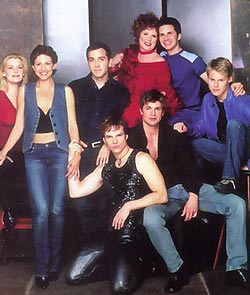
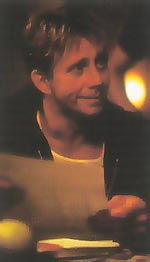 "This
next season certainly expands the storyline on HIV and AIDS," says
Jack Wetherall, who portrays the aforementioned Uncle Vic, "and
I am delighted about that." This season, a new HIV-positive
character, Ben Bruckner (played by Robert Gant), will be introduced
as the love interest of Michael Novotny, played by Hal Sparks. "This
whole dating issue is such a big thing," says Wetherall. When
I was a younger man I sowed my oats. I was wild. But,
in the sixties and seventies, society was exploring sexual freedom
and I felt supported. I really appreciate the fact that I had
that available to me as a young man. Now, I worry about the
younger generation coming along with the same desires and impulses.
They have to be much more careful. As Uncle Vic says
in the first season, 'No sex is fully safe.
If it is, you're doing it wrong.' There is always an
element of risk, but one needs to make it as safe as one possibly
can to be responsible, not only for one's own health but for one's
partner, as well."
"This
next season certainly expands the storyline on HIV and AIDS," says
Jack Wetherall, who portrays the aforementioned Uncle Vic, "and
I am delighted about that." This season, a new HIV-positive
character, Ben Bruckner (played by Robert Gant), will be introduced
as the love interest of Michael Novotny, played by Hal Sparks. "This
whole dating issue is such a big thing," says Wetherall. When
I was a younger man I sowed my oats. I was wild. But,
in the sixties and seventies, society was exploring sexual freedom
and I felt supported. I really appreciate the fact that I had
that available to me as a young man. Now, I worry about the
younger generation coming along with the same desires and impulses.
They have to be much more careful. As Uncle Vic says
in the first season, 'No sex is fully safe.
If it is, you're doing it wrong.' There is always an
element of risk, but one needs to make it as safe as one possibly
can to be responsible, not only for one's own health but for one's
partner, as well." 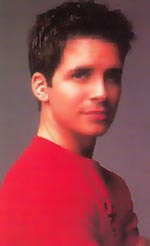 Sparks,
who teaches kung fu and speaks Mandarin, is spiritually grounded
in Eastern philosophy.
In the early nineties, Hal conducted lectures for spiritual
guru, Marianne Williamson, and worked as a volunteer for Project
Angel Food, which delivers hot meals to PWAs. "On a spiritual
level I feel the AIDS epidemic comes from an accumulation of sexual
guilt. The gay community has been forced to experience more
guilt because their sexuality has been so suppressed by society and
made to feel bad about it for so long. All STDs are kind of
an indication of feelings of guilt about oneself. Of course,
there are exceptions. And not to say that any person
who gets AIDS is weak, or is to blame for getting it, but we are
all susceptible to certain types of illnesses," says Sparks. "Being
on QAF is one of the ways I can help because the more free
that the gay community feels about themselves, the less susceptible
they are to certain things. We need to take hold of our psyche
before disease takes hold of our bodies. Ultimately, what will
help is a true sense of pride for gay people. And I mean pride
in the sense of 'I belong as much as anyone.' That will be
a big step in healing."
Sparks,
who teaches kung fu and speaks Mandarin, is spiritually grounded
in Eastern philosophy.
In the early nineties, Hal conducted lectures for spiritual
guru, Marianne Williamson, and worked as a volunteer for Project
Angel Food, which delivers hot meals to PWAs. "On a spiritual
level I feel the AIDS epidemic comes from an accumulation of sexual
guilt. The gay community has been forced to experience more
guilt because their sexuality has been so suppressed by society and
made to feel bad about it for so long. All STDs are kind of
an indication of feelings of guilt about oneself. Of course,
there are exceptions. And not to say that any person
who gets AIDS is weak, or is to blame for getting it, but we are
all susceptible to certain types of illnesses," says Sparks. "Being
on QAF is one of the ways I can help because the more free
that the gay community feels about themselves, the less susceptible
they are to certain things. We need to take hold of our psyche
before disease takes hold of our bodies. Ultimately, what will
help is a true sense of pride for gay people. And I mean pride
in the sense of 'I belong as much as anyone.' That will be
a big step in healing."  Randy
Harrison, another member of the cast, has also been a caregiver. Randy,
twenty-four, is an out actor, and portrays QAF's resident
teen, Justin Taylor. Randy began volunteering for ASOs while
still in high school. He worked with AID Atlanta and ASK US
(Adolescents Seeking Knowledge to Greater Understanding of STDs and
AIDS) whre he helped to provide safer sex education for teens, as
well as gay outreach.
"Volunteering gave me a sense of self," confides
Randy. He came out to his parents and close friends when he
was just fifteen. "I went to a very small conservative
Southern high school and our sex education was very...,"
he stops briefly, then continues, "They just tried to scare
us into a lifetime of celibacy. Abstinence is a viable
option if people are capable and choose to do that. That's
wonderful, though I think it's unrealistic for that to be the only
option."
Randy
Harrison, another member of the cast, has also been a caregiver. Randy,
twenty-four, is an out actor, and portrays QAF's resident
teen, Justin Taylor. Randy began volunteering for ASOs while
still in high school. He worked with AID Atlanta and ASK US
(Adolescents Seeking Knowledge to Greater Understanding of STDs and
AIDS) whre he helped to provide safer sex education for teens, as
well as gay outreach.
"Volunteering gave me a sense of self," confides
Randy. He came out to his parents and close friends when he
was just fifteen. "I went to a very small conservative
Southern high school and our sex education was very...,"
he stops briefly, then continues, "They just tried to scare
us into a lifetime of celibacy. Abstinence is a viable
option if people are capable and choose to do that. That's
wonderful, though I think it's unrealistic for that to be the only
option." 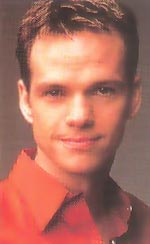 Another
cast member and out actor, Peter Paige, has a slightly different
take on sexuality and AIDS.
Paige plays the endearing nellie, Emmett Honeycutt, who he
says is the "least self-loathing and the best adjusted" of
the Pittsburgh pals. "You can't be sexually active and
not have a panic.
I came of age in the age of AIDS. I don't know anything
else. When I was a freshman in college, I was fortunate to
have a professor in the theater department who was a great gay activist
and counselor. He described condoms and dicks; it saved many
of our lives. I've done my time pacing in my living room for
that two-week waiting period for my test results," Paige laments. Though
he served as a volunteer for ASOs, Peter admits that he is more "political
than charitable." He hopes to use his celebrity to bring
about greater public awareness about HIV by hosting benefits and
by participating on AIDS committees. "We are in a dangerous
time. We've all became pretty complacent over the past decade
and now we find ourselves on the couch with a really scary man in
the White House."
Peter takes a breath, looks off to the side, and sadly reminisces. "An
older ex-boyfriend of mine showed me a photo of the softball team
he'd played on in the seventies. Most of them were either sick,
or dead..."
Another
cast member and out actor, Peter Paige, has a slightly different
take on sexuality and AIDS.
Paige plays the endearing nellie, Emmett Honeycutt, who he
says is the "least self-loathing and the best adjusted" of
the Pittsburgh pals. "You can't be sexually active and
not have a panic.
I came of age in the age of AIDS. I don't know anything
else. When I was a freshman in college, I was fortunate to
have a professor in the theater department who was a great gay activist
and counselor. He described condoms and dicks; it saved many
of our lives. I've done my time pacing in my living room for
that two-week waiting period for my test results," Paige laments. Though
he served as a volunteer for ASOs, Peter admits that he is more "political
than charitable." He hopes to use his celebrity to bring
about greater public awareness about HIV by hosting benefits and
by participating on AIDS committees. "We are in a dangerous
time. We've all became pretty complacent over the past decade
and now we find ourselves on the couch with a really scary man in
the White House."
Peter takes a breath, looks off to the side, and sadly reminisces. "An
older ex-boyfriend of mine showed me a photo of the softball team
he'd played on in the seventies. Most of them were either sick,
or dead..." 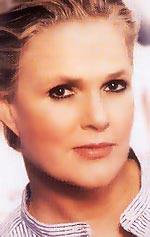 Though
a cutting edge series on many levels, QAF was not the first
one to exhibit a condom in prime time. Sharon Gless, who plays
the motherly eccentric, Debbie Novotny, reveals that her popular
eighties' award-winning TV show, Cagney & Lacey, was the
first show to ever incorporate a condom scene. "Lacey's
young son was going out on his first date and she went into her drawer,
pulled out a condom, and gave it to him. And this was the early
eighties!" she gasps. In a later episode, Sharon's character,
Christine Cagney, who had been separated from her boyfriend for a
time, reunites with him but warns that she will not have sex with
him unless he uses a condom. Sharon herself is an advocate
of condom distribution in high schools as part of safer sex education. When
asked what she would say to an auditiorium of young students, she
shouts, "Are you crazy? You need to use condoms! Do
you want to die?"
Though
a cutting edge series on many levels, QAF was not the first
one to exhibit a condom in prime time. Sharon Gless, who plays
the motherly eccentric, Debbie Novotny, reveals that her popular
eighties' award-winning TV show, Cagney & Lacey, was the
first show to ever incorporate a condom scene. "Lacey's
young son was going out on his first date and she went into her drawer,
pulled out a condom, and gave it to him. And this was the early
eighties!" she gasps. In a later episode, Sharon's character,
Christine Cagney, who had been separated from her boyfriend for a
time, reunites with him but warns that she will not have sex with
him unless he uses a condom. Sharon herself is an advocate
of condom distribution in high schools as part of safer sex education. When
asked what she would say to an auditiorium of young students, she
shouts, "Are you crazy? You need to use condoms! Do
you want to die?" 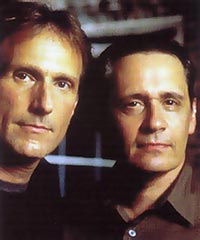 Indeed, QAF's
writers and co-producers, Daniel Lipman and Ron Cowen, believe that
it is essential that the latest medical information be presented
when dealing with the subject of AIDS. Cowen and Lipman, who've
been a writing team since the late sevenities and who have been romantically
linked for over twenty-five years, wrote the eighties' TV teleplay, An
Early Frost, for which they won an Emmy.
Starring Aidan Quinn, Gena Rowlands, Ben Gazzara, and Sylvia
Sidney, the mvoie focused on an American family confronting AIDS. "We
started off in the Dark Ages," Lipman specifies. "We
began working on An Early Frost in the spring of 1983, when
HIV was called GRID [Gay-Related Immune Deficiency].
In fact, when we started doing An Early Frost, NBC sent
us a book—and I still have it in the garage–where there
was a chapter about AIDS being carried by mosquitoes from Long Island."
He laughs, gibing that they should write a movie called The
Mosquitoes That Ate Long Island. During this time, the
AIDS epidemic was a chameleon—it took many faces, and was ever
changing.
New developments were being discovered almost daily. At
that time, the researchers didn't even realize that HIV was found
in saliva. On the set of An Early Frost, a medical advisor
was employed. Near the climax of the movie there is a scene
where a doctor explains to the family about their son's AIDS condition. "We
kept the scene on standby till two days before we aired to see if
there was any change in the research, so if need be, we could reshoot
the scene," says Ron. "We had the actor, Terry O'Quinn,
who played the doctor, on hold. This is what we were working
under."
Indeed, QAF's
writers and co-producers, Daniel Lipman and Ron Cowen, believe that
it is essential that the latest medical information be presented
when dealing with the subject of AIDS. Cowen and Lipman, who've
been a writing team since the late sevenities and who have been romantically
linked for over twenty-five years, wrote the eighties' TV teleplay, An
Early Frost, for which they won an Emmy.
Starring Aidan Quinn, Gena Rowlands, Ben Gazzara, and Sylvia
Sidney, the mvoie focused on an American family confronting AIDS. "We
started off in the Dark Ages," Lipman specifies. "We
began working on An Early Frost in the spring of 1983, when
HIV was called GRID [Gay-Related Immune Deficiency].
In fact, when we started doing An Early Frost, NBC sent
us a book—and I still have it in the garage–where there
was a chapter about AIDS being carried by mosquitoes from Long Island."
He laughs, gibing that they should write a movie called The
Mosquitoes That Ate Long Island. During this time, the
AIDS epidemic was a chameleon—it took many faces, and was ever
changing.
New developments were being discovered almost daily. At
that time, the researchers didn't even realize that HIV was found
in saliva. On the set of An Early Frost, a medical advisor
was employed. Near the climax of the movie there is a scene
where a doctor explains to the family about their son's AIDS condition. "We
kept the scene on standby till two days before we aired to see if
there was any change in the research, so if need be, we could reshoot
the scene," says Ron. "We had the actor, Terry O'Quinn,
who played the doctor, on hold. This is what we were working
under."